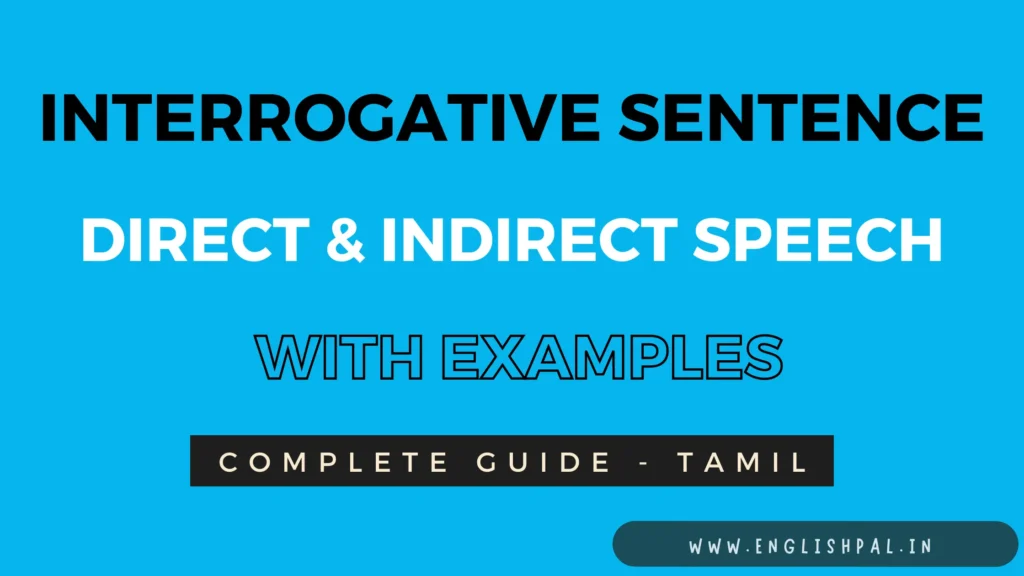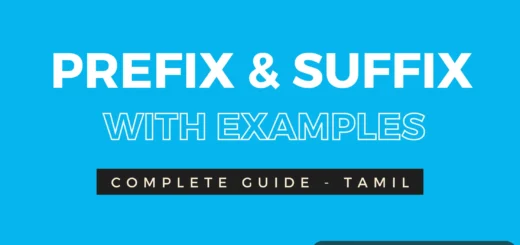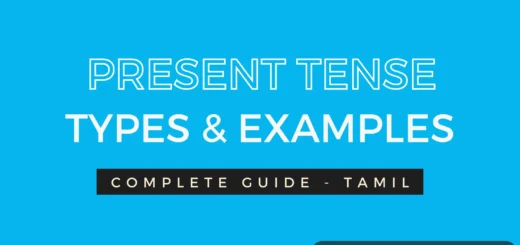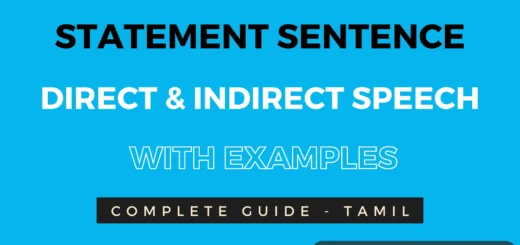Interrogative sentences – Direct & indirect speech in Tamil
Interrogative sentences
Interrogative sentences ஆனது தமிழில் வினா வாக்கியம் என்று அழைக்கப்படுகிறது.
ஒரு வினாவினை அல்லது கேள்வியினை கேட்க இந்த வினா வாக்கியங்கள் உதவுகின்றன.
மொத்தம் நான்கு வகை வாக்கியங்கள் இருப்பது நமக்கு தெரியும். அதில் நாம் எப்படி வினா வாக்கியத்தை கண்டறிவது? மிகவும் எளிது. அனைத்து வினா வாக்கியங்களும் கேள்விக்குறியினைக் கொண்டு முடியும். இதனைக்கொண்டு எளிதில் நாம் இவகை வாக்கியத்தை கண்டுபிடிக்கலாம்.

Interrogative வாக்கியத்தை Direct speech இல் இருந்து indirect speech ஆக மாற்ற
எப்படி ஒரு வினா வாக்கியத்தை நேர்கூற்றில் இருந்து அயற்கூற்றாக மாற்றுவது என படிப்படியாக இப்போது காண்போம்.
Step 1 – முதலில் கொடுக்கப்பட்ட வாக்கியம் எவ்வகை வாக்கியம் என கண்டறிந்து அதன் reporting verb ஐ மாற்ற வேண்டும்.
Interrogative sentence’s Reporting verbs
- Says – asks
- Says to – asks
- Said – asked
- Said to – asked
அதாவது says மற்றும் says to வரும் இடங்களில் நாம் asks எனவும், said, said to வரும் இடங்களில் asked எனவும் நாம் reporting verb ஐ மாற்ற வேண்டும்.
Step 2 – quotation mark ஐயும் comma வும் நீக்கி அதற்கு பதிலாக வாக்கியத்தின் வகைக்கு ஏற்ப சரியான conjunction ஐ உபயோகிக்க வேண்டும்.
Wh questions வரும்போது நாம் எந்த conjunctionஉம் உபயோகிக்கத் தேவையில்லை. ஆனால் Yes or no question வரும் போது நாம் If அல்லது whether Conjunction ஐ கட்டாயம் உபயோக்கிக்க வேண்டும்.
conjunctions பற்றி தெளிவாக எடுத்துக்காட்டுகளுடன் தெரிந்துகொள்ள இதை படிக்கவும்.
Conjunctions (இணைப்புச் சொற்கள்) with Examples in Tamil
Step 3 – வாக்கியத்தில் யார் யார்தான் யாரை பற்றி பேசுகின்றனர் என்று அறிந்து அதற்கேற்ப pronoun ஐ மாற்ற வேண்டும்.
Pronouns பற்றி முழுவதும் அறிய Pronoun (பிரதிப் பெயர்ச்சொல்) & it types in Tamil with examples
Step 4 – tense ஐ மாற்ற வேண்டும்.
tense என்றால் என்ன அதன் வகைகள் எப்படி மாற்றுவது என்பதை அறிய All 12 Tenses in Tamil with examples
Step 5 – adverbial ஐ அதன் பொருள் மாறாமல் மாற்ற வேண்டும்.
Step 6 – indirect speech ஆக மாற்றும்போது ஒரு வாக்கியத்தில் main verb மற்றும் auxiliary verb என வரும்போது auxiliary verb ஐ மட்டும் மாற்றினால் போதும்.
Step 7 – indirect speech ஆக மாற்றும்போது wh word க்கு பின்னால் கண்டிப்பாக subject வர வேண்டும். அதன் பின்னால் தான் auxiliary verb வர வேண்டும். indirect speech க்கு மாற்றிய பின் கேள்விக்குறியினை உபயோகிக்கக்கூடாது.
நாம் statement sentence இல் கூறியது போலவே இதற்கும் பொருந்தும். மேலே கூறிய அனைத்து steps உம அனைத்து வாக்கியங்களுக்கும் வராது. அந்த வாக்கியத்தில் உபயோகப்படுதப்பட்டுள்ள வார்த்தைகளை பொறுத்து மாறுபடும்.
Examples
Example 1
Direct speech – I said to her, “when have you finished your lunch?”
இந்த வாக்கியமானது கேள்விக்குறியை கொண்டு முடிந்துள்ளது. எனவே இது வினா வாக்கியம்.
1. வினா வாக்கியத்தின் reporting verb ஐ முதலில் மாற்ற வேண்டும். இங்கு said to என்பது asked என மாறும். – I asked her
2. வாக்கியமானது எந்த வார்த்தையை கொண்டு தொடங்கி உள்ளது என காண்கவும். இங்கு wh question இல் தொடங்கி உள்ளதால் நாம் எந்த conjunction உம் உபயோகிக்கத் தேவையில்லை. நாம் quotation mark ஐயும் comma வும் நீக்கி விடலாம். – I asked her when
3. you என்ற pronoun ஆனது she எனவும், your என்பது her எனவும் மாறும். மேலும் subject ஆனது wh question க்கு அடுத்து வரும். – I asked her when she
4. இந்த எடுத்துக்காட்டில் have, finished என இரண்டு verb வந்துள்ளன. எனவே நாம் auxiliary verb ஐ மட்டும் மாற்றினால் போதுமானது. அல்லது இந்த வாக்கியமானது present perfect இல் உள்ளது இதை past perfect ஆக மாற்ற வேண்டும்.
I asked her when she had finished her lunch.
5. இந்த வாக்கியத்தில் adverbial எதுவும் இல்லை. எனவே அதை நாம் தவிர்த்துக் கொள்ளலாம்.
Indirect speech – I asked her when she had finished her lunch.
Example 2
Rajan said to Rani, “Are we planning to take leave?”
1. வினா வாக்கியத்தின் reporting verb ஐ முதலில் மாற்ற வேண்டும். said to – asked – Raja asked rani
2. yes or no question type இல் தொடங்கி உள்ளதால் நாம் எந்த If அல்லது whether என்ற conjunction ஐ உபயோகிக்கவேண்டும். மேலும், quotation mark ஐயும் comma வும் நீக்கி விடலாம். – Raja asked rani if
3. we என்னும் pronoun ஆனது they என மாறும். மேலும் இங்கு present continuous tense ஆனது உபயோகப்படுத்தப்பட்டுள்ளது. அதனை past continuous tense ஆக மாற்ற வேண்டும். அதே போல் subject ஐ If க்கு அடுத்து கொண்டு வர வேண்டும்.
Rajan asked Rani If they were planning to take leave.
Example 3
Mani says to me, “How can I work like you?”
1. Reporting verb ஐ says to வில் இருந்து asks என மாற்றவும். – Mani asks me
2. quotation mark மற்றும் comma வை நீக்கவும். இங்கு wh question வந்துள்ளதால் எந்த conjunction ம் உபயோகிக்க தேவை இல்லை. – Mani asks me how
3. I என்பது he எனவும் you என்பது me எனவும் மாறும். – Mani asks me how he
4. இங்கு auxiliary verb ஐ மாற்றவும்.
Mani asks me how he could work like me.
Example 4
Ram asked me, “how is your life going?”
1. reporting verb ஐ asked என்பதை asked என வைக்கவும். – Ram asked me
2. quotation mark & comma வை நீக்கவும். இங்கு wh question உள்ளதால் எந்த conjunction தேவையில்லை. – Ram asked me how
3. you என்பது my என மாறும். மேலும் subject ஆனது wh question வார்த்தையை அடுத்து வரும். – Ram asked me how my life
4. இங்கு present continuous tense ஆனது உள்ளது. அதை past continuous tense ஆக மாற்ற வேண்டும்.
Ram asked me how my life was going.
Modal Auxiliary verbs, Prefix & suffix, Active & Passive voice, Conjunctions, Preposition பற்றி அறிய
Modal Auxiliary verbs (மாதிரி துணை வினைச்சொற்கள்) in Tamil
Prefix and suffix in Tamil with examples
Active and Passive voice in Tamil
Example 5
The manager said to Ramesh, “How is your trainee’s performance?”
1. Reporting verb ஐ said to என்பதை asked என வைக்கவும். – The manager asked Ramesh
2. Quotation mark & comma வை நீக்கவும். இங்கு எந்த conjunction தேவையில்லை (wh question). – The manager asked Ramesh how
3 .Your என்பது his என மாறும். is என்பது was ஆக மாறும். Wh question க்கு பின்னால் subject வரும்.
The manager asked Ramesh how his trainee’s performance was.
Example 6
My friend said to me, “Why haven’t you started practicing good habits?”
1. Reporting verb ஐ said to என்பதை asked என மாற்றவும். – My friend asked me
2. Quotation mark & comma வை நீக்கவும். இங்கு நாம் எந்த conjunction தேவையில்லை – My friend asked me why
3. You என்பது I என மாறும். – My friend asked me why I
4. Present perfect tense ஆனது past perfect tense ஆக மாறும். Wh question க்கு பின்னால் subject வரும்.
My friend asked me why I hadn’t started practicing good habits.
Example 7
The manager asked his worker, “Are you coming to the office tomorrow?”
1. முதலில் reporting verb ஐ மாற்ற வேண்டும். இங்கு asked என வந்துள்ளதால் நாம் அதையே உபயோகிக்கலாம். – The manager asked his worker
2. Quotation mark & comma வை நீக்கவும். இங்கு yes or no question type வந்துள்ளது. எனவே நாம் If or whether ஐ உபயோகிக்க வேண்டும். – The manager asked his worker If
3. இங்கு you என்பது he என மாறும். – The manager asked his worker If he
4. Present continuous tense ஐ past continuous tense ஆக மாற்ற வேண்டும். – The manager asked his worker If he was coming to the office
5. இங்கு adverbial ஆனது வந்துள்ளது. அதனையும் மாற்ற வேண்டும். tomorrow என்பது the next day என மாறும்.
The manager asked his worker If he was coming to the office the next day Or The manager asked his worker whether he was coming to the office the next day.
Example 8
Siva said to her, “Did you watch the movie?”
1. Said to என்ற reporting verb ஐ asked என மாற்ற வேண்டும். – Siva asked her
2. yes or no question type வந்துள்ளதால் If அல்லது whether ஐ உபயோகிக்க வேண்டும். – Siva asked her if
3. you என்பது he என மாறும். – Siva asked her if she
4. Present perfect tense ஐ past perfect tense ஆக மாற்ற வேண்டும்.
Siva asked her if she had watched the movie.
Example 9
Ramu said to Somu, “Shall we watch a movie?”
1. இந்த வாக்கியம் வினா வாக்கியத்தில் இருப்பதால் said to என்ற reporting verb ஐ asked என மாற்ற வேண்டும். – Ramu asked Somu
2. இங்கு yes or no question type வந்துள்ளதால் If அல்லது whether ஐ உபயோகிக்க வேண்டும். – Ramu asked Somu If
3. we என்பது they என மாறும். – Ramu asked Somu If they
4. இங்கு shall மற்றும் watch என இரண்டு verbs வந்துள்ளன. இத்தகைய சூழ்நிலையில் auxiliary verb ஐ மட்டும் மாற்றினால் போதும். எனவே shall என்பது should என மாறும்.
Ramu asked Somu If they should watch a movie.
Example 10
He said to me, “What were you playing?”
1. Said to என்ற reporting verb ஐ asked என மாற்ற வேண்டும். ஏனெனில் இது வினா வாக்கியத்தில் உள்ளது. – He asked me
2. Wh question type இல் உள்ளதால் conjunction உபயோகப்படுத்தத் தேவை இல்லை. – He asked me what
3. Past continuous tense இல் வந்துள்ளதால் அதை past perfect continuous tense க்கு மாற்ற வேண்டும்.
He asked me what I had been playing.
Example 11
Raja said to the shopkeeper, “where is the chocolate section?”
1. Said to என்ற reporting verb ஐ asked என மாற்ற வேண்டும். – Raja asked the shopkeeper
2. Wh இல் இருப்பதால் conjunction தேவை இல்லை. – Raja asked the shopkeeper where
3. is என்பது was என மாறும்.
Raja asked the shopkeeper where the chocolate section was.
Example 12
Mahesh said to me, “Have you participated in any games?”
Mahesh asked me If I had participated in any games.
இந்த எடுத்துக்காட்டானது எப்படி மாற்றுவதை இந்த பதிவின் comments இல் பதிவிடுங்கள்.
Direct speech and indirect speechஅறிய Direct speech and Indirect speech in Tamil
Conclusion
ஒரு வினா வாக்கியமானது எப்படி இருக்கும், அதனை எப்படி நேர்கூற்றில் இருந்து அயற்கூற்றாக மாற்றுவது என்பதை எடுத்துக்கட்டுக்களுடன் மிக விரிவாக பார்த்தோம். ஒவ்வொரு எடுத்துக்காட்டையும் நாம் எப்படி மாற்றுவது என விளக்கியுள்ளதால் உங்களுக்கு இது இன்னும் தெளிவாக புரிந்திருக்கும் என நம்புகிறோம்.
உங்களுக்கு இண்டிகா வினாவாக்கியம் பற்றிய பதிவில் எதேனும் சந்தேகம் இருப்பின் அதனை comment இல் பதிவிடுங்கள். நாங்கள் உங்கள் சந்தேகங்களுக்கு பதில் அளிக்க காத்துக்கொண்டு இருக்கிறோம்.
இந்த பதிவை பற்றிய உங்கள் கருத்துக்களை கமெண்ட் செய்யுங்கள். இது எங்களுக்கு மற்ற பதிவுகளை எழுத மிகவும் ஊக்குவிப்பாக இருக்கும்.
மற்ற வகை வாக்கியங்களை எப்படி direct to indirect speech ஆக மாற்றுவது என்பதை வரும் பதிவுகளில் காணலாம்.
நன்றி!




Clear explanation and great work sir.
Thanks mam. Please feel free to forward our content to anybody you know who could benefit from it.